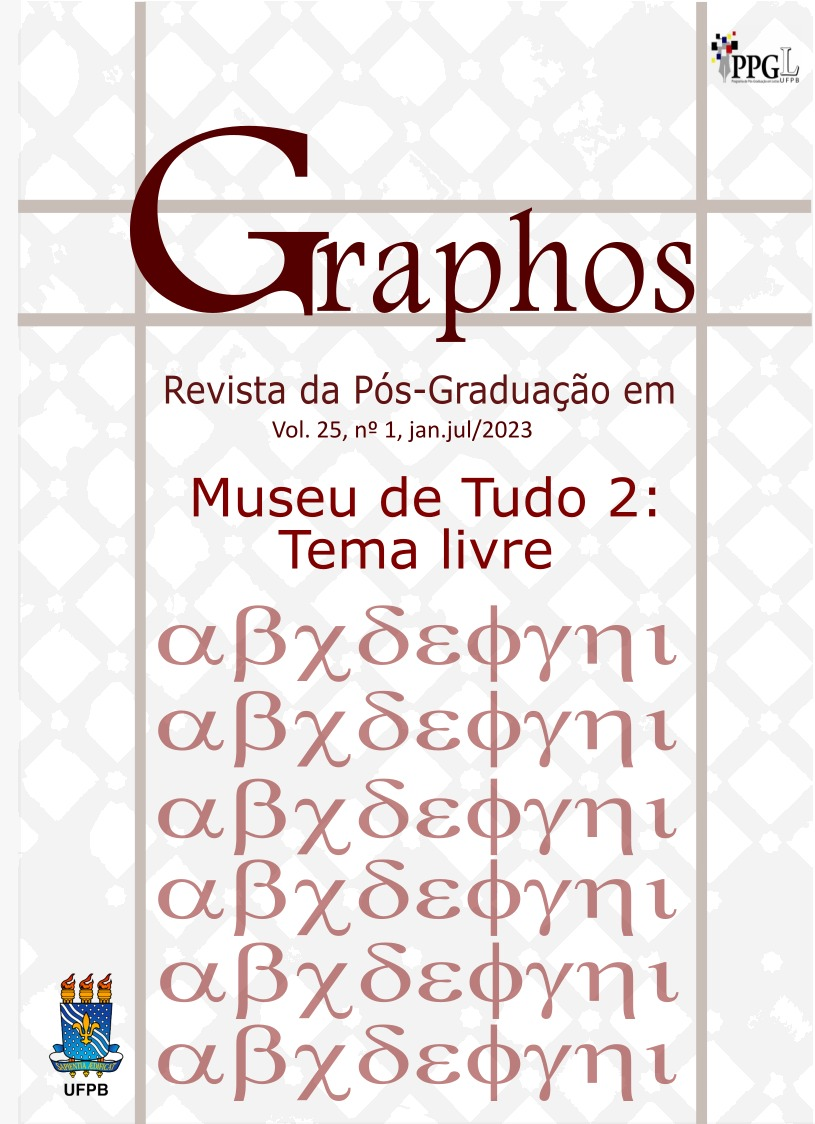THE NOVELISTIC ANTIFICTION AS A COMMITMENT TO THE TRUTH, THROUGH AUTOFICTION AND TESTIMONY
DOI:
https://doi.org/10.22478/ufpb.1516-1536.2023v25n1.64333Keywords:
Fiction, Parresia, Antifiction, Autofiction, TestimonyAbstract
The article observes the phenomenon of the demand for the real in contemporary narrative based on one of its most experimental tendencies: autofiction as a possibility of testimony literature and memory fixation, as resistance to the politics of forgetfulness. To do so, we resort to the commitment to the truth of the self-writings, which Foucault called parresia, because, according to Bakhtin, the novel became a complex art by assimilating genres in which the self speaks of itself and begins to manifest truths that the unpersonal narrative does not reach. The notion of antifiction, created by Lejeune, is basic for this demand to be seen as an explanation for what has happened with the novel. Instead of seeing only the self-writings as antifictional, we opted for the idea of the novelistic antifiction, starting from the concept of fiction by Searle, who does not oppose it to the truth, but sees it as the result of a pact of reading. Antifiction as a model of parresia mentions in here many paradigmatic works, which embraces since self-writing to novel, but focuses, mainly, Marcelo Rubens Paiva, Milton Hatoum and Patrick Modiano as models of testimony that treats trauma, those which Finazzi-Agrò considers the inter-dito that awakes an empathy in the reader because the truth the passional contains.
Downloads
References
AGAMBEN, Giorgio. O que resta de Auschwitz: o arquivo e a testemunha (Homo Sacer III). Tradução de Selvino J. Assman. São Paulo: Boitempo, 2008.
ALBERCA, Manuel. De la autoficción a la antificción. Por la autobiografia. In: Cuardernos Hispanoamericanos. Mesa Revuelta, n. 776, 2018, p. 107-122. Disponível em: https://docero.com.br/doc/80ex5. Acessado em: 11/maio/2021.
BAKHTIN, Mikhail. Teoria do romance I: a estilística. Tradução de Paulo Bezerra. São Paulo: Editora 34, 2015.
FINAZZI-AGRÒ, Ettore. (Des)memória e catástrofe: considerações sobre a literatura pós-golpe de 1964. In: Estudos de Literatura Brasileira Contemporânea, Brasília, UnB, n. 43, jan./jun. 2014, p. 179-190. DOI: https://doi.org/10.1590/S2316-40182014000100010
FOUCAULT, Michel. A coragem da verdade: o governo de si e dos outros II. Tradução de Eduardo Brandão. São Paulo: Editora WWF Martins Fontes, 2011.
FOUCAULT, Michel. A hermenêutica do sujeito. Tradução de Márcio Alves da Fonseca e Salma Tannus Muchail. 2 ed., São Paulo: Martins Fontes, 2006.
HAMBURGER, Käte. A lógica da criação literária. Tradução de Margot P. Malnic. 2 ed., São Paulo: Perspectiva, 1986.
HATOUM, Milton. A noite da espera. O lugar mais sombrio. Volume 1. 1 ed., São Paulo: Companhia das Letras, 2017.
ISER, Wolfgang. O fictício e o imaginário: perspectivas de uma antropologia literária. Tradução de Johannes Kretschmer. 2 ed., Rio de Janeiro: Editora da UERJ, 2013.
LEJEUNE, Philippe. Autoficções & CIA: peça em cinco atos. In: NORONHA, J. M. G. (Org.) Ensaios sobre a autoficção. Tradução de Jovita Maria G. Noronha e Maria Inês Coimbra Guedes. Belo Horizonte: Editora da UFMG, 2008.
LEJEUNE, Philippe. Le journal comme “antifiction”. In: Poétique, n. 149, 2007, p. 3-14. Disponível em: https://www.cairn.info/revue-poetique-2007-1-page-3.htm. Acessado em: 11/maio/2021. DOI: https://doi.org/10.3917/poeti.149.0003
LIMA, Luiz Costa. História. Ficção. Literatura. São Paulo: Companhia das Letras, 2006.
MODIANO, Patrick. Dora Bruder. Tradução de Márcia Cavalcanti Ribas Vieira. Rio de Janeiro: Rocco, 2014. DOI: https://doi.org/10.1525/9780520962026
PAIVA, Marcelo R. Ainda estou aqui. 1 ed., Rio de Janeiro: Objetiva, 2015.
PÉCORA, Alcir. Milton Hatoum falha ao ser literário demais em novo romance. In: Folha de S. Paulo. 24 de Outubro de 2019, s/p. Disponível em: https://www1.folha.uol.com.br/ilustrada/2019/10/milton-hatoum-falha-ao-ser-literario-demais-em-novo-romance.shtml Acesso em 21/set./2022.
RICOEUR, Paul. A memória, a história, o esquecimento. Tradução de Alain François et al. Campinas: Editora da UNICAMP, 2007.
RICOEUR, Paul. Tempo e narrativa. Tradução de Cláudia Berliner e Márcia Valéria Martinez de Aguiar. São Paulo: WMF Martins Fontes, 1994.
SEARLE, John R. Intencionalidade. Tradução de Júlio Fischer e Tomás Rosa Bueno. 2 ed., São Paulo: Martins Fontes, 2002a.
SEARLE, John R. O estatuto lógico do discurso ficcional. In: SEARLE, John R. Expressão e significado: estudos da teoria dos atos de fala. Tradução de Ana Cecília G. A. de Camargo e Ana Luíza Marcondes Garcia. 2 ed., São Paulo: Martins Fontes, 2002b.
SELIGMANN-SILVA, Márcio. Narrar o trauma – a questão do testemunho de catástrofes históricas. In: Psicologia Clínica, Rio de Janeiro, 2008, v. 20, n. 1, p. 65-80. DOI: https://doi.org/10.1590/S0103-56652008000100005
WITTGENSTEIN, Ludwig. Investigações filosóficas. Vários tradutores. São Paulo: Nova Cultural, 2000.
Downloads
Published
Issue
Section
License
Copyright (c) 2023 Edson Ribeiro da Silva

This work is licensed under a Creative Commons Attribution 4.0 International License.







